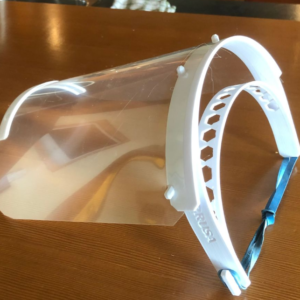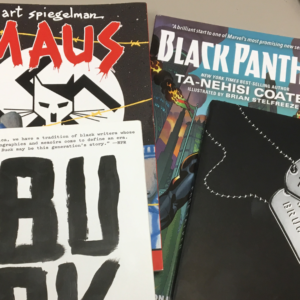Welcome, Empower and Teach
The small room, decorated with colorful posters and toys, looks like any preschool classroom. Toddlers push trucks on a carpet, build with blocks, and serve plastic food in a play kitchen. Parents hover along the walls, watching closely. At least four different languages are spoken here today.
Refugee Support Services is located in rented space in the Galilee Center, a former church on Central Avenue, and this room is the site of weekly children’s programs offered by the Charlotte Mecklenburg Library’s outreach department. The program is timed to coincide with other activities at the bustling center, so while children are occupied by storytime, family members can navigate the logistics of making a home in a new place – from picking up fresh vegetables to attending English and citizenship classes, or receiving help with tax, health, school, housing, DMV, job applications, and other paperwork. Today, many attend a workshop offered by police officers about what to do and how to be prepared if a refugee is detained for any reason.
In the children’s room, a very ordinary storytime program has extraordinary impact. It is a poignant reminder that these families are seeking a better life for their children, and recognize that education and literacy are the keys. Enthusiastic, attentive children call out the colors and animal names in English in Eric Carle’s classic Brown Bear, Brown Bear, What Do You See? Librarian Emily Little models Active Reading skills for the parents in the room, many who speak limited English and have varying levels of education themselves. She reads and sings from the oversized book, and distributes regular sized copies to caregivers, so they can follow along. Throughout the story, Little asks questions and invites children to make predictions about what will happen next, or relate the characters in the story to their own experiences. Many are holding finger puppet or cutout versions of each animal, following the story through a tactile play experience. After the book is finished the children make their own puppets, to retell the story of Brown Bear at home.
The parents are as eager to learn as their children. Samla, a mother of two from Morocco, incorporates literacy activities into her home life. “I started bringing my son here while I went to English classes, and now my class is over but I still bring him. He’s learned so much – about sharing, letters, colors – and so have I. I’ve learned how to work with him and read with him at home. I don’t have this kind of experience, so this program always gives me ideas. Both of my children love books, and we visit Library branches.”
Anne Banks, the Education Programs Coordinator at Refugee Support Services, notes that for many of the children, this weekly Library program is their window into preschool. It helps to establish a sense of normalcy and routine for children, while modelling important behaviors for adults. “They are learning from each other, how to take turns and share and play together. They are all different ages and speak different languages and come from different countries, but they develop relationships and learn to get along. And the parents are learning how to share a book and a story with their children, to instill early literacy skills.”
Library programs like this one welcome, empower, and teach families creating a new life in the community we share, but they also impact those who provide the service. Emily Little explains, “Doing this program has changed my life. I’ve become so much more vocal and understanding about the challenges these families face. I know real people, I know their children are sweet, and smart, and they just need opportunities. I’m so thankful to be able to make even a small difference.”



